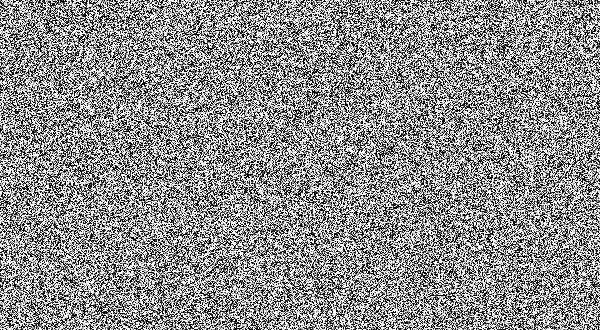What is White Noise and Why Should We Listen to it?

Many people have adopted the habit of sleeping with the TV on. They insist that without that background noise it is much more difficult to get to sleep. The explanation for this could be put down to white noise, and this is an idea that is becoming increasingly popular.
The background sound on the TV, when it is not tuned in to any channel, is an example of white noise. As is a radio which is between stations. We can even encounter white noise in the sound that an air conditioner emits. What these all have in common is that there is a constant and monotonous sound. Many people claim that it is extremely relaxing and reassuring.
The neuroscientist Seth Horowitz has indicated that “white noise is literally a wall of sonic energy, without patterns”. The idea that it helps us to sleep has spread so much that there are already technological applications that produce it.
“Night is the hardest time to be alive.”
-Poppy Z. Brite-
Does white noise have positive effects?
From the biological point of view, we can see that white noise masks or helps us to ignore other noises that come from the environment. If any other audible stimuli appear, they are unlikely to be able to activate the cerebral cortex during sleep.
This, in other words, means that white noise is a kind of invisible and protective screen. It functions as a barrier to other sounds. People who are more inclined to wake up with any other noises in their surroundings don’t have a problem in sleeping through the hum of white noise.

We should remember that hearing is the only sense that continues to function fully during sleep. The reason for this is because it is essential for survival. If all the senses were completely turned off, there would be no way to detect danger and wake up in order to ward it off.
However, this has the disadvantage of sometimes making the ear very sensitive to the noises that occur while we sleep. There are people who wake up several times a night after hearing a bark, a car or people talking. In these cases, white noise helps to prevent this and can help us to sleep happily and peacefully.
The objections to white noise
Although thousands of people in the world insist that white noise is a great ally to sleep, this is not scientifically proven. So far no studies have been written to to either corroborate or contradict that position. However, that doesn’t mean there haven’t been many people who have spoken against this hypothesis.
Seth Horowitz said that, in the long term, white noise could affect the hair cells in our inner ear. These are the cells that allow us to capture sounds. What this expert suggests is that a prolonged exposure to this type of noise forces the hair cells to work at peak performance. The consequence of this is that, if they should get damaged in any way, the natural process of repairing such damage would be impaired or might not even kick in at all.

Just as there is still no scientific evidence on the benefits of white noise, there is no research that says there aren’t any benefits. What there is is an increasing number of people in the world who turn to white noise to sleep better. It has even proven to be very effective with babies and is sometimes used to aid concentration while studying.
Other people have begun to talk about noises of other colors, for example, of “brown noise”. This is the noise that a distant waterfall produces. It is also a monotonous and calming sound, but a natural one. There is also talk of “pink noise”, which describes something that isn’t as regular, like rain for example. All these noises have similar effects.
Sleep problems and white noise
Some scholars have suggested that sleep disorders should not be treated with these kinds of “tricks”. They tell us that behind insomnia there may lie a multitude of causes that we should investigate in depth. Perhaps white noise does help you to sleep. This, however, doesn’t solve other problems that may have caused your sleeping difficulties in the first place.
Rather than being a problem in itself, insomnia is the outward expression of deeper problems. In most cases, the inability to fall asleep can be put down to states of anxiety and unresolved conflicts. Therefore, although white noise can be useful to solve your sleep problems, it may also be disguising the symptoms of a major illness.

The truth of the matter is that not being able to sleep has disastrous consequences. Not only does it exacerbate nervousness and depression, it also markedly affects physical health. That is why it is not unreasonable to resort to these sort of “tricks”. They are, of course, much less harmful than taking sedatives or the passive acceptance of a recurrent sleeplessness.
Perhaps the most intelligent option is to find a good compromise. If white noise makes it possible to solve insomnia problems, then it may well be a good idea to try it out. At the same time, however, we shouldn’t forget that there could be other underlying difficulties that we shouldn’t ignore. Even though we may have managed to cover up the real cause with a “patch”, we should be striving to find out the root cause.
Many people have adopted the habit of sleeping with the TV on. They insist that without that background noise it is much more difficult to get to sleep. The explanation for this could be put down to white noise, and this is an idea that is becoming increasingly popular.
The background sound on the TV, when it is not tuned in to any channel, is an example of white noise. As is a radio which is between stations. We can even encounter white noise in the sound that an air conditioner emits. What these all have in common is that there is a constant and monotonous sound. Many people claim that it is extremely relaxing and reassuring.
The neuroscientist Seth Horowitz has indicated that “white noise is literally a wall of sonic energy, without patterns”. The idea that it helps us to sleep has spread so much that there are already technological applications that produce it.
“Night is the hardest time to be alive.”
-Poppy Z. Brite-
Does white noise have positive effects?
From the biological point of view, we can see that white noise masks or helps us to ignore other noises that come from the environment. If any other audible stimuli appear, they are unlikely to be able to activate the cerebral cortex during sleep.
This, in other words, means that white noise is a kind of invisible and protective screen. It functions as a barrier to other sounds. People who are more inclined to wake up with any other noises in their surroundings don’t have a problem in sleeping through the hum of white noise.

We should remember that hearing is the only sense that continues to function fully during sleep. The reason for this is because it is essential for survival. If all the senses were completely turned off, there would be no way to detect danger and wake up in order to ward it off.
However, this has the disadvantage of sometimes making the ear very sensitive to the noises that occur while we sleep. There are people who wake up several times a night after hearing a bark, a car or people talking. In these cases, white noise helps to prevent this and can help us to sleep happily and peacefully.
The objections to white noise
Although thousands of people in the world insist that white noise is a great ally to sleep, this is not scientifically proven. So far no studies have been written to to either corroborate or contradict that position. However, that doesn’t mean there haven’t been many people who have spoken against this hypothesis.
Seth Horowitz said that, in the long term, white noise could affect the hair cells in our inner ear. These are the cells that allow us to capture sounds. What this expert suggests is that a prolonged exposure to this type of noise forces the hair cells to work at peak performance. The consequence of this is that, if they should get damaged in any way, the natural process of repairing such damage would be impaired or might not even kick in at all.

Just as there is still no scientific evidence on the benefits of white noise, there is no research that says there aren’t any benefits. What there is is an increasing number of people in the world who turn to white noise to sleep better. It has even proven to be very effective with babies and is sometimes used to aid concentration while studying.
Other people have begun to talk about noises of other colors, for example, of “brown noise”. This is the noise that a distant waterfall produces. It is also a monotonous and calming sound, but a natural one. There is also talk of “pink noise”, which describes something that isn’t as regular, like rain for example. All these noises have similar effects.
Sleep problems and white noise
Some scholars have suggested that sleep disorders should not be treated with these kinds of “tricks”. They tell us that behind insomnia there may lie a multitude of causes that we should investigate in depth. Perhaps white noise does help you to sleep. This, however, doesn’t solve other problems that may have caused your sleeping difficulties in the first place.
Rather than being a problem in itself, insomnia is the outward expression of deeper problems. In most cases, the inability to fall asleep can be put down to states of anxiety and unresolved conflicts. Therefore, although white noise can be useful to solve your sleep problems, it may also be disguising the symptoms of a major illness.

The truth of the matter is that not being able to sleep has disastrous consequences. Not only does it exacerbate nervousness and depression, it also markedly affects physical health. That is why it is not unreasonable to resort to these sort of “tricks”. They are, of course, much less harmful than taking sedatives or the passive acceptance of a recurrent sleeplessness.
Perhaps the most intelligent option is to find a good compromise. If white noise makes it possible to solve insomnia problems, then it may well be a good idea to try it out. At the same time, however, we shouldn’t forget that there could be other underlying difficulties that we shouldn’t ignore. Even though we may have managed to cover up the real cause with a “patch”, we should be striving to find out the root cause.
This text is provided for informational purposes only and does not replace consultation with a professional. If in doubt, consult your specialist.







